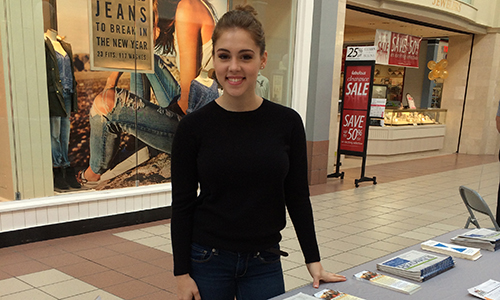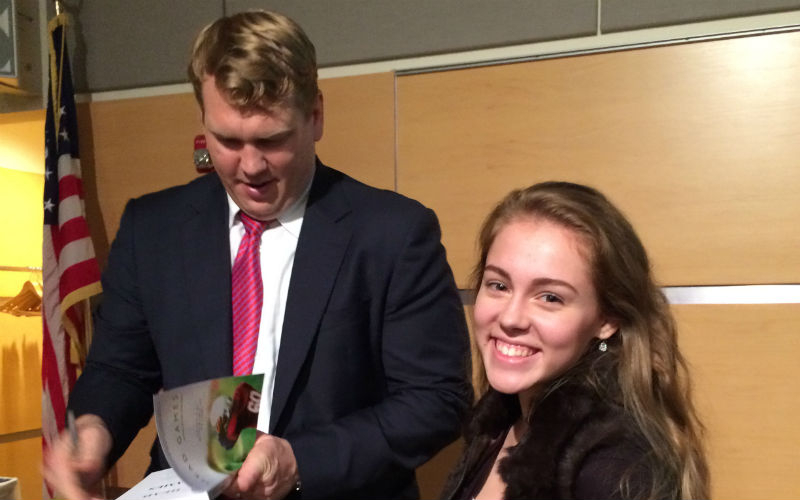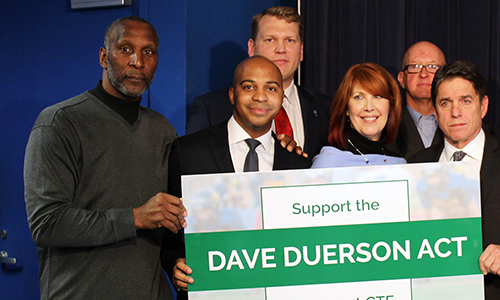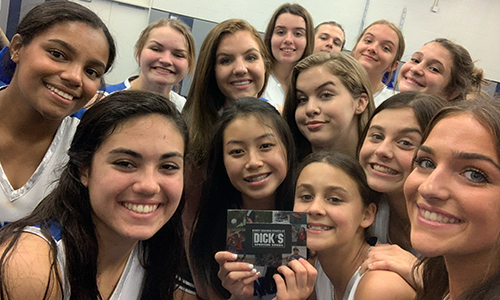Get Inspired
A High Schooler Lessens the Impact of Concussions
Since suffering a severe concussion her freshman year of high school, 16-year-old Brooke Mills has been working relentlessly to educate her community on concussions – all while trying to recover from her own, maintain success in school, and be a normal teenager. Brooke holds educational workshops for her high school peers, who she feels are among the most important populations for concussion education.

Posted: January 12, 2016
Concussion Legacy Foundation Champion Chris O'Connor spoke to Brooke about her story and her message to others.
What was the first example of cognitive impairment that you can remember after the concussion? How did it make you feel?
After having my concussion, I found myself falling asleep in class. This wasn’t like me at all. I’ve always been a good student. I also had a really hard time focusing in class and remembering things. I felt scared and it made me realize that this concussion was serious. I felt overwhelmed in school and in life in general due to my cognitive impairments.
How did your concussion impact your academic life?
I had to study more and harder. Homework took me twice as long, writing essays took me twice as long. I’m constantly staying after class with the teacher to be sure I have all of the due dates of projects and the dates of tests written down, because I know I won’t remember them. I’ve had to learn new study habits and have been lucky to have the help of my Spanish tutor to show me new methods of memorization and learning. For the first year following my concussion, my grades suffered. It’s been almost two years since my injury and my grades are finally back to where they were before my concussion, but it still takes more effort than before to achieve an “A”.

Brooke met Concussion Legacy Foundation Executive Director Chris Nowinski at the organization's 8th Annual Impact Awards in November, 2015.
Do you have any suggestions for your peers about concussions, specifically for those recently diagnosed, or for friends of people experiencing symptoms?
I recommend avoiding getting a concussion! But if it happens to you, notify every teacher about your injury so they can understand what is going on with you. Talk to your school nurse and guidance counselor to have academic accommodations made and a return-to-learn plan put in place. It’s important to realize that using your brain in academics is stressful to your injured brain and can worsen your symptoms or slow your recovery. Your coach will keep you off the field until you’re cleared and ready to return to sports play, but I’ve found that when it comes to academics you need to speak up for yourself to get help.
Are there any particular activities that have helped with your symptoms?
Sleep helps a lot. I’ve found my symptoms are worse when I don’t stay rested. Even almost two years after the impact, I still have triggers of post-concussion symptoms. Running, jumping and dance class still cause headaches for me, as does bright light or flashing lights. Long school days followed by a lot of homework also causes me to have a headache. It’s frustrating not to be able to do the some of the things that I enjoyed before my concussion.
Why are you passionate about promoting education and awareness about TBI?
I’m passionate because I see it as a rising crisis for kids my age, whether the head trauma comes from sports, a car accident or a fall, teens are at risk. It seems like most of America isn’t aware of what a concussion is and how to deal with it. If everyone were more educated about TBI, then we could be more supportive of people around us who are suffering from a brain injury. When I first suffered my concussion some classmates doubted my injury, thought it wasn’t a big deal or had a concussion of their own and didn’t think much of it. No one should be made to feel like they are being dramatic or faking their injury. I want to educate teens and adults so they can be more understanding and know what to do if someone they care about suffers a TBI.
____________________

The following segment is from Brooke’s website, http://www.lessentheimpact.org.
I wish I could tell you what happened, but I don’t remember the details. In March of my freshman year, I was accidentally kicked in the head and knocked unconscious during play in a mandatory gym class. I was diagnosed with a concussion, but no one knew how severe it would be.
I lost weeks of school. Unfortunately, I had no baseline testing, so I was cleared to return to activities before I was fully healed. Academics became extremely challenging; many of my teachers didn’t know how to make the appropriate accommodations for Post-Concussion Syndrome. Over a year later, although greatly improved, I still continue to have post-concussion headaches and memory issues causing me to struggle to be the “A” student I was prior to my brain injury.
It is estimated that as many as 3.8 million concussions happen in the U.S. per year in competitive sports; however, up to 50% of those concussions go unreported. Many kids don’t report their injury because they are afraid of being judged as “wimp,” or being denied participating in the sports they love. Others think a concussion isn’t a big deal since the wounds aren’t visible.
During my own recovery I felt isolated, discouraged, frustrated, and angry. I was teased for wearing sunglasses when I was sensitive to light. I was made to feel as if I were “faking” my issues by many of my peers. I wasn’t able to continue in my after school activities that I loved so much. In reality, just getting by on a day-to-day basis was difficult. I don’t want other kids to go through what I did. Physically having a concussion is bad enough, the extra emotional toll it takes is unnecessary.
We can act together to lessen the impact of a concussion on a child by being a more understanding school community and support system. Everyone in the community should become more educated about concussions. Teachers, coaches and parents need to be aware of the severity of a concussion, it is by definition a mild traumatic brain injury, and should be taken seriously. We should encourage kids through awareness and education to report their injuries and any symptoms that could indicate a concussion has happened. By talking about concussions and creating a greater understanding, we improve the outlook not just for the injured person, but for everyone involved.
You May Also Like

Help us raise awareness about concussions, PCS and CTE in your community. Learn how to create positive change by becoming a CLF Champion.
Become a CLF Champion
There are many ways you can help contribute to CLF. See how you can fundraise in your community and beyond to support our work.
Ways to Give